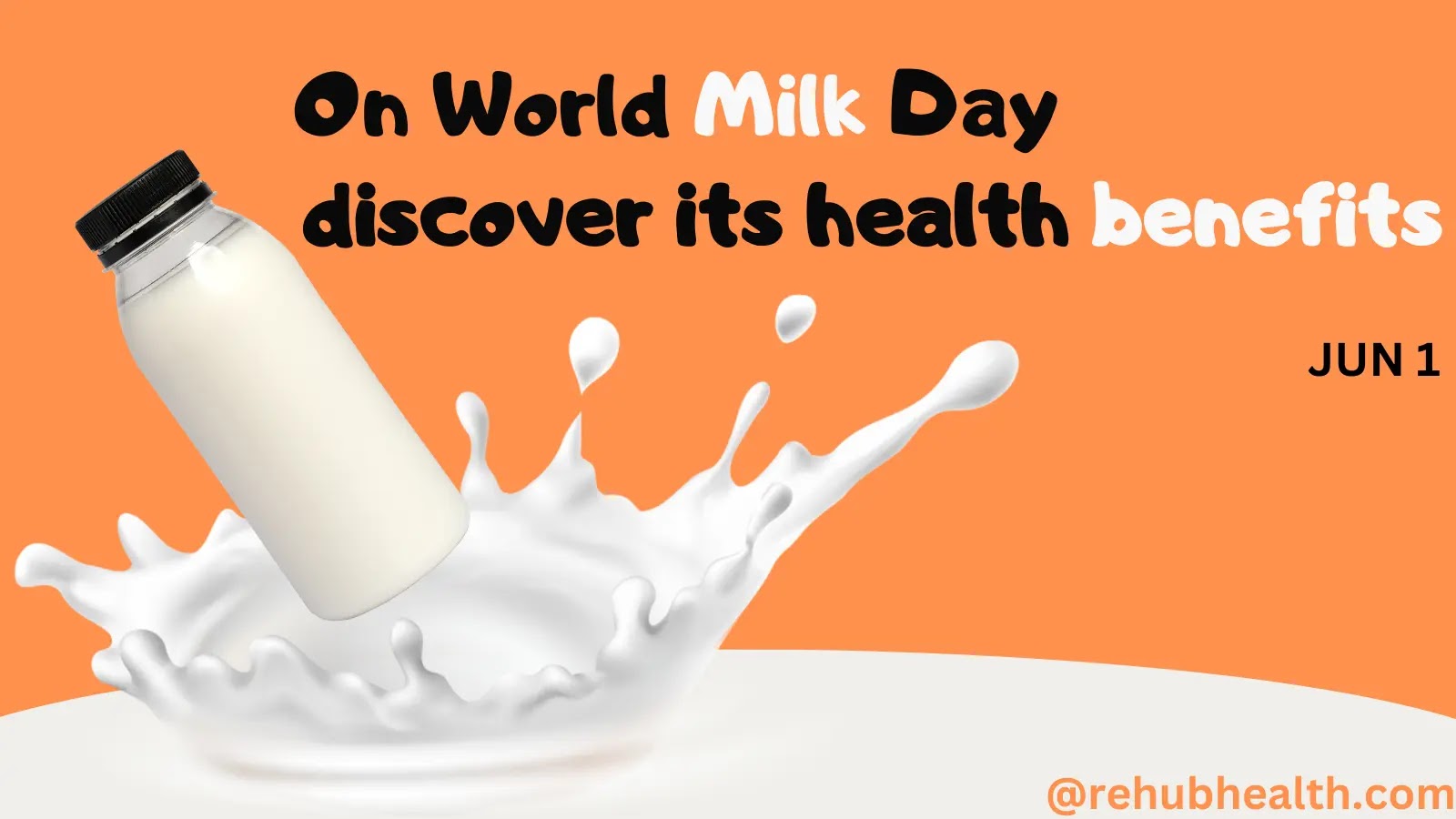Health Benefits of Milk
Overview
First and before talking about the importance of milk and its irreplaceable nutritional value, as well as its many benefits on physical and mental health, we will refer to an important occasion related to this White drink, namely World Milk Day.
World Milk Day
World Milk Day is an annual celebration that aims to highlight the importance of milk and raise awareness about its numerous health benefits. Observed on June 1st each year, this global event provides an opportunity to recognize the significance of milk in our lives and the dairy industry's contributions to nutrition and sustainable agriculture. In this article, we will explore the nutritional value of milk, and discuss its health benefits.
Nutritional Value of Milk
Milk is a nutrient-rich beverage that contains a wide range of essential nutrients. It is an excellent source of calcium, which is vital for bone health and development. Additionally, milk contains high-quality protein that contains all the essential amino acids required by the body. Furthermore, milk provides vitamins such as vitamin A, vitamin D, vitamin B12, and minerals like potassium and phosphorus. These nutrients collectively contribute to the overall nutritional value of milk.
Health Benefits of Milk
Milk is a widely consumed dairy product that has been recognized for its numerous health benefits for centuries. Packed with essential nutrients, milk serves as a versatile and refreshing beverage that can contribute significantly to overall well-being. In the following, we will explore the various health benefits of milk and shed light on why it is considered a vital part of a balanced diet.
1. Nutritional Profile of Milk
Milk is a nutritional powerhouse, containing an array of essential nutrients necessary for optimal health. It is an excellent source of calcium, protein, vitamins, and minerals. Let's delve deeper into some of the specific health benefits associated with milk consumption.
2. Calcium and Bone Health
Calcium plays a crucial role in maintaining strong and healthy bones throughout life. It is especially important during childhood and adolescence when bone development is at its peak. Milk is renowned for its high calcium content, making it an ideal choice for promoting bone health. Regular consumption of milk can help prevent conditions like osteoporosis and reduce the risk of fractures.
3. Protein for Muscle Growth and Repair
Protein is an essential macronutrient responsible for muscle growth, repair, and maintenance. Milk contains all nine essential amino acids, making it a complete protein source. Athletes and individuals engaging in physical activities can benefit from milk's protein content, as it aids in muscle recovery and enhances overall performance.
4. Vitamins and Minerals
In addition to calcium and protein, milk is rich in vitamins and minerals vital for various bodily functions. It is an excellent source of vitamins A, D, and B12, as well as minerals like phosphorus, potassium, and magnesium. These nutrients play a crucial role in maintaining a healthy immune system, supporting nerve function, and promoting overall vitality.
5. Hydration and Electrolyte Balance
Milk can serve as a hydrating beverage, contributing to hydration due to its high water content. Additionally, it contains essential electrolytes such as potassium, sodium, and chloride, which help maintain proper fluid balance in the body. Whether consumed alone or as an ingredient in smoothies or shakes, milk can help replenish fluids and electrolytes lost during physical activity or hot weather.
6. Weight Management
Contrary to popular belief, including milk in a balanced diet can be beneficial for weight management. The combination of protein and calcium in milk helps promote a feeling of fullness, leading to a reduction in overall calorie intake. Additionally, the protein content aids in building and preserving lean muscle mass, which contributes to a higher metabolic rate.
7. Gut Health and Probiotics
Milk contains beneficial bacteria known as probiotics, which contribute to gut health. Probiotics help maintain a healthy balance of microorganisms in the gut, supporting digestion and improving nutrient absorption. Including probiotic-rich milk products, such as yogurt or kefir, in the diet can help promote a healthy gut microbiome.
8. Improved Dental Health
Milk plays a vital role in maintaining dental health. The calcium and phosphorus present in milk is essential for strong teeth and the prevention of tooth decay. Regular consumption of milk can help protect tooth enamel and reduce the risk of cavities. It is worth noting that while milk is beneficial, practicing good oral hygiene, such as regular brushing and flossing, is equally important.
9. Skin Health and Beauty
Milk contains several nutrients that promote skin health and contribute to a radiant complexion. The presence of vitamins A and E, as well as lactic acid, helps nourish and moisturize the skin, improving its texture and appearance. Many skincare products incorporate milk or its derivatives due to its beneficial effects on the skin.
10. Potential Allergies and Lactose Intolerance
While milk offers numerous health benefits, it is essential to address potential allergies and lactose intolerance. Some individuals may be allergic to milk proteins, experiencing symptoms such as hives, swelling, or digestive issues. Lactose intolerance, on the other hand, is the inability to digest lactose, the natural sugar found in milk. Fortunately, there are alternative options available, such as lactose-free milk or plant-based alternatives like soy or almond milk.
Conclusion
Milk is a versatile and nutrient-rich beverage that provides an array of health benefits. From supporting bone health to contributing to muscle growth and repair, milk offers a wide range of essential nutrients that are beneficial for overall well-being. Incorporating milk into a balanced diet can help individuals of all ages maintain a healthy lifestyle.
FAQs
1. Is milk suitable for individuals with lactose intolerance?
While milk contains lactose, which can cause digestive issues for those with lactose intolerance, there are lactose-free milk options available in the market. Additionally, plant-based alternatives like soy or almond milk can be suitable alternatives.
2. Does milk consumption lead to weight gain?
Milk can be a part of a healthy weight management plan. The protein and calcium in milk can contribute to a feeling of fullness and support muscle growth, which can aid in weight management.
3. Are there any milk alternatives for individuals with allergies?
Yes, individuals with milk allergies can opt for plant-based alternatives like soy, almond, or oat milk. These alternatives can provide similar nutritional benefits to cow's milk.
4. Can milk improve skin health?
Milk contains nutrients like vitamins A and E and lactic acid, which can contribute to improved skin health. Many skincare products utilize milk or its derivatives due to its moisturizing and nourishing properties.
5. How much milk should one consume daily?
The recommended daily milk consumption can vary depending on age, sex, and overall dietary needs. However, a general guideline is to aim for two to three servings of dairy or dairy alternatives per day, as part of a balanced diet






